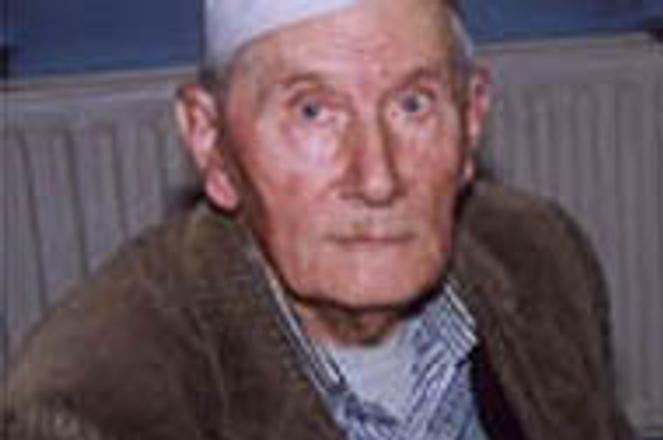Rusyn elder Štefan Bunganič is determined to chronicle Rusyn philology.photo: Ján Feškanič
ZBUDSKÁ BELA: A stroke has slowed Štefan Bunganič down in his golden years. The retired chemist, mathematician and scholar still gets around, but his limbs are not entirely obedient. They seem heavy when he changes position, and jiggle when he walks. But his spirit is bouyant, and his resolve remains fixed on one last, long, final project.
"I want to write a book on the philology [structure] of the Rusyn [Ruthenian] language," he says, sitting in his modest home in the small eastern Slovak village of Zbudská bela and patting a worn notebook containing thousands of words he has been collecting for over 30 years. "And I'm going to stick around long enough to finish it."
Bunganič's sense of Rusyn indentity has survived political upheavals, border changes and assimilation pressures [see sidebar], and now, near the end of his long life, under a government supporting rather than supressing ethnic expression, he is intent on contributing to the birth of his mother tongue as a written language.
"Rusyn is a distinct nationality and without effort we will disappear, like the Native Americans in North America," he said, flipping through a manual he has already written on Rusyn phonology, morphology and phonetics. "Language is the most important thing. To have a nationality you must have a language. To have a culture you must have a language."
Official leaders in eastern Slovakia's Prešov from the country's Rusyn organisation Rusynska Obroda (Rusyn Revival) agree. Many of their efforts since founding the organisation in 1991 have revolved around developing a literary language for Slovakia's estimated 100,000 Rusyns. Their most important moment in this process came in 1995 when the Rusyn dialect spoken in Slovakia was officially codified, an event they hoped would pave the way for its use as a language in schools and, eventually, a new literary tradition.
But codifying the language is one thing, and convincing people to use it is another. While leaders and academics in Prešov, as well as locals such as Bunganič, work to map the language, put out publications and train teachers to teach Rusyn in schools, a different attitude prevails among ordinary Rusyns living in small villages and cities in eastern Slovakia, who grew up speaking Rusyn at home, but using Slovak (or in some cases Ukrainian) in official settings.
In Medzilaborce, a poor city of roughly 7,000 near the Polish border, Rusyns are the overwhelming majority - it's Rusyn, not Slovak, being spoken in the home, on the streets, in the pubs and at churches. But hardly anyone, a handful of professionals excepted, is interested in promoting their language beyond its spoken use. In recent interviews, many inhabitants of Slovakia's largest predominantly Rusyn town said they had never heard of the some 30 Rusyn-language books that have been printed in Slovakia since 1989.
"The survival of the Rusyn language doesn't matter one bit to me. I consider Rusyn a dialect, a language spoken at home," says one Rusyn man over a beer in a small Medzilaborce pub. On the walls, behind him and his group of Rusyn friends, hang advertisements in Slovak. The menus and signs are also in Slovak.
Unlike another of Slovakia's minority languages, Hungarian, Rusyn has Slavic roots; Rusyns do not speak Slovak with an accent or have any other linguistic difficulties with the majority tongue. Why should they have signs in Rusyn, some ask, when visitors won't be able to understand? Why should they read small-budget Rusyn papers when they get their news everyday from national papers in Slovak? Why should they want their children to study in Rusyn when they will have to switch to Slovak to study at a university?
Even more telling, perhaps, is that the average Rusyn isn't even considering these questions.
"The Rusyn language has no meaning in the context of Slovakia moving towards Europe," the man in the pub continued. "I have a small son. I speak Slovak with him so that he will have good command of the language when he gets to school. And for a second language I would like him to study English."
Another pub-goer close by expressed more affection for the language, but still questioned the purpose of developing it into a written form. "I want to speak Rusyn with my children. Whenever I see Rusyns, we, of course, only speak Rusyn, but I don't really see what the point would be in my learning how to read and write in Rusyn when I live in Slovakia."
Even some leading the charge sometimes wonder what it's all about. At the end of a long day in his office, Fedor Vico, a caricaturist and vice-chairman of Rusínksa Obroda, shrugged his shoulders when asked why he personally was working towards promoting Rusyn as a written language, and admitted with a tinge of sadness, "sometimes, I don't even know."
But later he reiterated that the struggle to establish the language was the struggle to keep Rusyn culture and identity separate form Slovak - a struggle for survival. "Our goal, after all the years of having our identity suppressed, is for Rusyns to be Rusyns, not to lose our culture and not to be assimilated."
In the post-communist Slavic world, at least seven other local 'mother tongues' are attempting to make the jump to literary languages. Like those languages, Rusyn needed a sense of passion among some of its members to begin a linguistic revival in 1989. Now, pragmatism and the priorities of modern times are sharply limiting the scope of that revival. And the future of the Rusyn language and culture in Slovakia as a distinct phenomenon remains uncertain.

